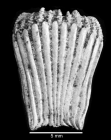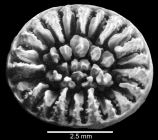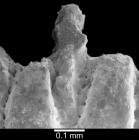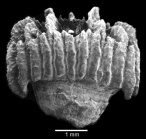Scleractinia taxon details
Idiotrochus Wells, 1935
267500 (urn:lsid:marinespecies.org:taxname:267500)
accepted
Genus
Sphenotrochus emarciatus Duncan, 1865 † accepted as Idiotrochus emarciatus (Duncan, 1865) (type by original designation)
Sphenotrochus (Idiotrochus) Wells, 1935 · unaccepted > superseded combination
- Species Idiotrochus alatus Cairns, 2004
- Species Idiotrochus australis (Woods & Duncan, 1865)
- Species Idiotrochus emarciatus (Duncan, 1865)
- Species Idiotrochus kikutii (Yabe & Eguchi, 1941)
- Species Idiotrochus strongylus Kitahara & Cairns, 2021
- Species Idiotrochus perexigua (Dennant, 1906) accepted as Idiotrochus emarciatus (Duncan, 1865) (unaccepted > junior subjective synonym)
marine, fresh, terrestrial
recent + fossil
(of Sphenotrochus (Idiotrochus) Wells, 1935) Wells JW. (1935). Notes on some turbinolid corals. <em>Annals and Magazine of Natural History, Series 10.</em> 16: 529-535, pl. 18. [details]
Status originally described as a subgenus of Sphenotrochus, but elevated to genus level by Vaughan and Wells (1943)
Depth range 82-645 m
Fossil range Early Oligocene to Recent
Status originally described as a subgenus of Sphenotrochus, but elevated to genus level by Vaughan and Wells (1943) [details]
Depth range 82-645 m
Depth range 82-645 m [details]
Fossil range Early Oligocene to Recent
Fossil range Early Oligocene to Recent [details]
Hoeksema, B. W.; Cairns, S. (2024). World List of Scleractinia. Idiotrochus Wells, 1935. Accessed at: https://marinespecies.org/scleractinia/aphia.php?p=taxdetails&id=267500 on 2025-04-04
Date
action
by
original description
(of Sphenotrochus (Idiotrochus) Wells, 1935) Wells JW. (1935). Notes on some turbinolid corals. <em>Annals and Magazine of Natural History, Series 10.</em> 16: 529-535, pl. 18. [details]
context source (Hexacorallia) Fautin, Daphne G. (2013). Hexacorallians of the World. (look up in IMIS) [details]
basis of record van der Land, J. (ed). (2008). UNESCO-IOC Register of Marine Organisms (URMO). , available online at http://www.marinespecies.org/urmo/ [details]
additional source Cairns, S.D., L. Gershwin, F.J. Brook, P. Pugh, E.W. Dawson, O.V. Ocaña, W. Vervoort, G. Williams, J.E. Watson, D.M. Opresko, P. Schuchert, P.M. Hine, D.P. Gordon, H.I. Campbell, A.J. Wright, J.A.Sánchez & D.G. Fautin. (2009). Phylum Cnidaria: corals, medusae, hydroids, myxozoans. <em>in: Gordon, D.P. (Ed.) (2009). New Zealand inventory of biodiversity: 1. Kingdom Animalia: Radiata, Lophotrochozoa, Deuterostomia.</em> :59-101., available online at https://repository.si.edu/handle/10088/8431 [details] Available for editors
additional source Cairns, S.D., R. Baron-Szabo, A.F. Budd, B. Lathuilière, E. Roniewicz, J. Stolarski & K.G. Johnson. (2010). Corallosphere. , available online at http://www.corallosphere.org [details]
redescription Cairns, S.D. (1989). A revision of the ahermatypic Scleractinia of the Philippine Islands and adjacent waters, Part 1: Fungiacyathidae, Micrabaciidae, Turbinoliinae, Guyniidae, and Flabellidae. <em>Smithsonian Contributions to Zoology.</em> 486: 1-136. [details] Available for editors
redescription Cairns, S.D. (1997). A generic revision and phylogenetic analysis of the Turbinoliidae (Cnidaria: Scleractinia). <em>Smithsonian Contributions to Zoology.</em> 591: 1-55. [details] Available for editors
context source (Hexacorallia) Fautin, Daphne G. (2013). Hexacorallians of the World. (look up in IMIS) [details]
basis of record van der Land, J. (ed). (2008). UNESCO-IOC Register of Marine Organisms (URMO). , available online at http://www.marinespecies.org/urmo/ [details]
additional source Cairns, S.D., L. Gershwin, F.J. Brook, P. Pugh, E.W. Dawson, O.V. Ocaña, W. Vervoort, G. Williams, J.E. Watson, D.M. Opresko, P. Schuchert, P.M. Hine, D.P. Gordon, H.I. Campbell, A.J. Wright, J.A.Sánchez & D.G. Fautin. (2009). Phylum Cnidaria: corals, medusae, hydroids, myxozoans. <em>in: Gordon, D.P. (Ed.) (2009). New Zealand inventory of biodiversity: 1. Kingdom Animalia: Radiata, Lophotrochozoa, Deuterostomia.</em> :59-101., available online at https://repository.si.edu/handle/10088/8431 [details] Available for editors
additional source Cairns, S.D., R. Baron-Szabo, A.F. Budd, B. Lathuilière, E. Roniewicz, J. Stolarski & K.G. Johnson. (2010). Corallosphere. , available online at http://www.corallosphere.org [details]
redescription Cairns, S.D. (1989). A revision of the ahermatypic Scleractinia of the Philippine Islands and adjacent waters, Part 1: Fungiacyathidae, Micrabaciidae, Turbinoliinae, Guyniidae, and Flabellidae. <em>Smithsonian Contributions to Zoology.</em> 486: 1-136. [details] Available for editors
redescription Cairns, S.D. (1997). A generic revision and phylogenetic analysis of the Turbinoliidae (Cnidaria: Scleractinia). <em>Smithsonian Contributions to Zoology.</em> 591: 1-55. [details] Available for editors
 Present
Present  Inaccurate
Inaccurate  Introduced: alien
Introduced: alien  Containing type locality
Containing type locality
From editor or global species database
Comparison Differs from Sphenotrochus in having a papillose columella, P1-2, and alternating costae. [details]Diagnosis Corallum asexually reproduces by transverse division, the anthocyathus cuneiform in shape, often with downward projecting costal spurs (“fishtails”); GCD up to 6.6 mm; theca imperforate; costae independent, smooth (porcellaneous) and flat, alternating in position with septa; septa hexamerally arranged in 3 cycles; 1 crown of 10 or 12 pali; columella linear-papillose. [details]
Remark This genus and family was monographed by Cairns (1997), which included a phylogenetic analysis based on morphology. Four species, two of them known as fossils (see Cairns, 2004). [details]
Status originally described as a subgenus of Sphenotrochus, but elevated to genus level by Vaughan and Wells (1943) [details]
Unreviewed
Biology azooxanthellate [details]Depth range 82-645 m [details]
Fossil range Early Oligocene to Recent [details]




